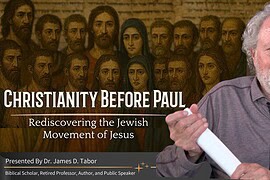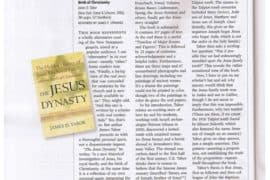This is the third installment of my response to the review of my book, The Jesus Dynasty, by my friend and colleague Prof. James F. Strange published in the Biblical Archaeology Review (November/December, 2006, pp. 72-76). You can read Parts 1 and 2 here and here.

Toward the end of Dr. Strange’s review he plays with me a bit and I am happy to indulge him in a bit of irony. He writes:
And by the way, he [Tabor] tells us a “shocking truth,” namely that Jesus and his followers were never baptized in the name of the Father, the Son and the Holy Spirit. Is he being ironic? Indulge me in a little irony. No, James! Say it ain’t so!
Dr. Strange is referring to my discussion in chapter 9 of my book that deals with “Jesus the Baptizer” in which I make the point that the baptism that John the Baptizer administered, as well as that carried out by Jesus and his disciples, was not a “Christian Baptism” in the name of the Father, Son, and Holy Spirit–or for that matter even “in the name of Jesus Christ” as in Acts 2:38 and elsewhere in the New Testament.
This might be a simple and obvious point but I would emphasize two things in this regard.
First, according to the unique tradition preserved in the gospel of John, we could properly speak of “Jesus the Baptizer” in parallel with the better known designation of “John the Baptizer,” notice:
After this Jesus and his disciples went into the land of Judea; there he remained with them and baptized. John also was baptizing at Aenon near Salim, because there was much water there; and people came and were baptized (John 3:22).
Here we find that Jesus has teamed up with John and together they carried out a joint baptizing campaign. Jesus went south to the area of Judea, while John was working in the Galilee, in the north, along the Jordan River. Our Synoptic gospels (Mark, Matthew, Luke) know nothing of this tradition and I have argued that because of its difficulty theologically–namely having Jesus administering baptism at all–it has a high probability of being authentic.
Second, it is clear that Jesus and these apostles, which included Peter, Andrew, James, John, Thomas, Phillip–the whole lot of them–were only baptized into “John’s baptism,” and the baptism Jesus and his disciples were administering was also “John’s baptism.” It goes without saying that Jesus himself, whom John baptized, was not baptized in his own name! But what this means is that none of them were ever initiated into a baptism “in the name of Jesus Christ,” or ” into “Christ,” as Paul subsequently develops it (Acts 2:38; 1 Corinthians 12:12, Romans 6:3-4). Even after the day of “Pentecost,” when the book of Acts begins to record people being baptized “in the name of Jesus Christ,” there is no indication whatsoever that Peter, James, John, or any of the other apostles were re-baptized into this new “Christian” form of the ritual. In fact, the author of Acts himself cites the “baptism of John” as marking the beginning of their “apostleship” (Acts 1:21-22). I do indeed think many readers will find that idea to be somewhat disturbing and shocking. First that Jesus baptized at all, and second that “his” baptism was not “Christian” in any sense that would distinguish it from what John was preaching and practicing.
But there is more to this point, taking us beyond Prof. Strange’s irony here. It is the case that Matthew and Matthew alone has Jesus commission his Eleven followers, after his resurrection, to make disciples of all nations and baptize them “in the name of the Father, Son, and Holy Spirit” (Matthew 28:19). I have no idea if Dr. Strange believes Jesus ever said such a thing on a mountain in Galilee before he ascended to heaven but most scholars would consider it highly unlikely that Jesus used such Trinitarian language. It appears to be drawn from later Christian liturgy and put in his mouth to give authority to the new Christian baptism of the Church, which was in sharp distinction from the baptism preached and practiced by John, and even Jesus for that matter.
One has to also wonder if this Trinitarian formula, so near and dear to the hearts of Christians today, was even in the original copies of the gospel of Matthew. True, it is included in current manuscripts and copies of Matthew but those containing chapter 28 date to the 4th century CE. It is entirely possible that it is a later interpolation. When Eusebius, the 4th century church historian quotes the “Great Commission” of Matthew 28 he regularly omits the phrase “in the name of the Father, the Son, and the Holy Spirit,” putting instead “in my name.” It is also worth noting that Hebrew Matthew (Ibn Shaprut’s text published by George Howard) lacks the phrase entirely. This is not a moot point in that the book of Acts makes a great deal of the utter ineffectiveness of “John’s baptism” in contrast to the new Christian baptism administered by Paul “in the name of Jesus” that allows those baptized to “receive the Holy Spirit” (Acts 19:1-7). The clear implication of Luke’s idea here is that those baptized by John (and by extension those baptized by Jesus), which would include the Twelve Apostles, never really received Christian baptism. I do indeed consider that “shocking” to many readers who might have assumed, as Paul affirms, that there was “one baptism,” that is the one that put one “into Christ.”
I am convinced that Paul’s teaching in this case has so clouded things that it is difficult to imagine John and Jesus living and dying without ever knowing anything about “Christian baptism.” What I seek to do in my book is put them both against the context of an apocalyptic Judaism, and a baptism of repentance for the remission of sins, to prepare one for the imminent judgment that was expected. In the case of John’s baptism we also have a source outside the New Testament gospels, namely that of the historian Josephus. Not only does he record that John administered the rite of baptism, but he offers a bit of theological analysis of its purposes–surely a rare and valuable bit of data. Josephus’s description makes clear that the activities of John fit comfortably within the Judaism of his time and have no connections with Pauline baptism or subsequent Christian formulas.
I don’t mind Dr. Strange poking a bit of fun at me here. In fact I think this part of his review was rather appealing in its tone. However, I would not want readers to miss the underlying seriousness of the points I make in chapter 9. I truly believe they are profound, with, yes “shocking” implications for the practice of Christianity in the name of Jesus today.









Comments are closed.